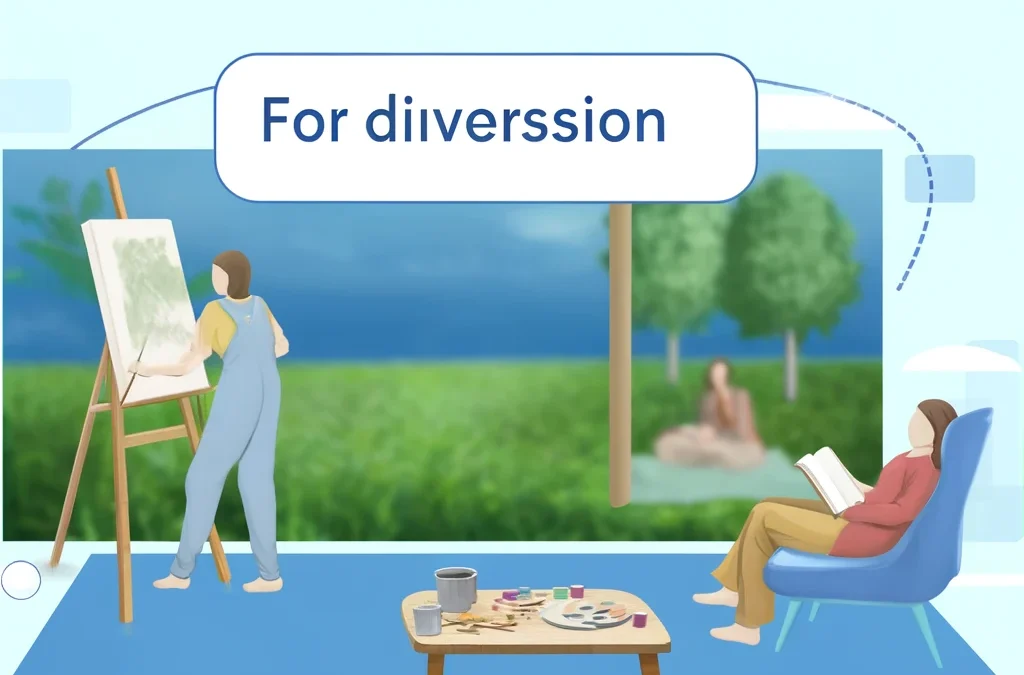語源・類義語・反対語・例文
【Diversion – 気分転換】という単語の語源とか由来を知っていますか?
「Diversion」という単語は、ラテン語の「divertere」から派生しています。これは、「別の方向に向ける」または「逸らす」という意味です。この動詞は、「di-」(離れて)と「vertere」(回す)の組み合わせで、文字通りには「異なる方向に回す」や「注意をそらす」を意味します。初期には、物理的な方向転換や道路の逸脱という意味で使われていましたが、時間が経つにつれて、注意や関心を別の対象や活動に移すという精神的な意味でも用いられるようになりました。現代英語では、退屈や不安から気を紛らわせる何か、つまり気分転換や娯楽を指すために使われます。
The word “diversion” derives from the Latin “divertere,” meaning “to turn aside” or “to divert.” This verb is a combination of “di-” (apart) and “vertere” (to turn), literally meaning “to turn in a different direction” or “to divert attention.” Initially, it was used in the context of physical detours or deviation from a path, but over time, it also came to signify the mental act of shifting attention or interest to a different object or activity. In contemporary English, it is used to denote something that distracts from boredom or anxiety, i.e., a form of distraction or entertainment.
この単語の類義語・反対語を教えてください。
類義語
- Distraction: 注意散漫、気晴らし。
- Amusement: 楽しみ、娯楽。
- Entertainment: 娯楽、エンターテインメント。
- Pastime: 時間つぶし、趣味。
- Recreation: レクリエーション、娯楽活動。
- Relief: 安堵、軽減。
- Divertissement: 娯楽、気晴らし。
反対語
- Concentration: 集中。
- Focus: 焦点、集中。
- Work: 仕事、労働。
- Engagement: 関与、従事。
- Monotony: 単調、一本調子。
- Boredom: 退屈。
- Stress: ストレス。
この単語に似た単語で間違いやすい単語はありますか?
類義語
- Distraction: 気晴らし、注意散漫。
- Amusement: 娯楽、楽しみ。
- Entertainment: エンターテイメント、娯楽。
- Pastime: 気晴らし、趣味。
- Recreation: レクリエーション、娯楽。
- Relief: 安堵、一時的な解放。
- Respite: 一時的な休息、猶予。
反寧語
- Focus: 集中、焦点。
- Concentration: 集中力。
- Work: 仕事、労働。
- Engagement: 従事、関与。
- Task: 任務、仕事。
- Monotony: 単調、一本調子。
- Routine: 日課、ルーチン。
この単語を使った例文を5つほど教えてください。
After a long day at work, I like to take a walk in the park as a diversion.
(長い一日の仕事の後、気分転換に公園を散歩するのが好きです。)
Reading a novel is my favorite diversion from the stress of daily life.
(小説を読むことは、日常生活のストレスからの気分転換の一番の方法です。)
Playing a musical instrument provides a great diversion and helps me relax.
(楽器を演奏することは素晴らしい気分転換になり、リラックスするのに役立ちます。)
Going for a swim in the pool is a refreshing diversion during hot summer days.
(プールで泳ぐことは、暑い夏の日に爽やかな気分転換です。)
Traveling to new destinations offers an exciting diversion from the routine of daily life.
(新しい場所への旅行は、日常生活のルーティンからの刺激的な気分転換を提供します。)
【diversion – 気分転換】のコロケーション
- Create a diversion: 「気晴らしを作る」。何か新しい活動や出来事を導入することで、人の注意を現在の状況やストレスから遠ざけることを指します。
- Seek a diversion: 「気晴らしを求める」。退屈やストレスから逃れるために、何か別の活動や娯楽を探す行動を意味します。
- Find a diversion: 「気晴らしを見つける」。現在の状態から一時的に離れ、リラックスするための方法や活動を見つけることを指します。
- Provide a diversion: 「気晴らしを提供する」。他人がストレスや問題から一時的に解放されるよう、娯楽や活動を提供することを意味します。
- Use diversion as a strategy: 「気晴らしを戦略として使う」。特定の目的を達成するために、人の注意をそらすための方法として気晴らしを利用することを指します。これは、例えば子供を落ち着かせるためや、交渉中に相手の注意を他に向けるために使用されることがあります。
「diversion」とは、気分転換や注意の逸脱を意味する英単語で、主にストレスや退屈から一時的に逃れるために用いられます。この言葉は、人々が日常のプレッシャーや問題から心の休息を得るための活動や娯楽に関連して使われることが多いです。
まず、”Create a diversion”は、「気晴らしを作る」という意味で、ストレスの多い状況や困難な時期から人々の注意をそらすために新しい活動やイベントを導入することを指します。このアプローチは、人々がリラックスし、元気を取り戻すのに役立ちます。
次に、”Seek a diversion”は「気晴らしを求める」と訳されます。これは、個人が退屈やストレスから解放される方法として、新しい趣味や活動を探求する行動を指します。人々はしばしば、心をリフレッシュするために別の活動に没頭します。
“Find a diversion”は、「気晴らしを見つける」という意味で、個人が現在のストレスや悩みから離れて、心の安らぎを見つけるための方法や活動を発見することを指します。これは、自身の幸福感を高めるために重要なプロセスです。
“Provide a diversion”は「気晴らしを提供する」という意味で、他人に楽しみや安らぎを提供する行動を指します。これにより、友人や家族がストレスから解放され、ポジティブな経験を共有することができます。
最後に、”Use diversion as a strategy”は、「気晴らしを戦略として使う」という意味です。これは、注意をそらすために気晴らしを利用することを指し、教育の場やビジネスの環境、個人的な関係の中で効果的な手法として用いられます。
“Diversion” is an English word meaning a change of mood or a deflection of attention, mainly used to temporarily escape from stress or boredom. This term is often associated with activities or entertainment that allow people to take a mental break from daily pressures and problems.
First, “Create a diversion” means to introduce new activities or events to divert people’s attention from stressful situations or difficult times. This approach helps individuals relax and regain their energy.
Next, “Seek a diversion” translates to the action of looking for new hobbies or activities as a way to be released from boredom or stress. People often immerse themselves in different activities to refresh their minds.
“Find a diversion” means discovering methods or activities that allow an individual to detach from current stress or worries and find peace of mind. This process is important for enhancing one’s sense of well-being.
“Provide a diversion” refers to the act of offering enjoyment or relaxation to others. This allows friends and family to be freed from stress and share positive experiences.
Finally, “Use diversion as a strategy” means employing diversion to divert attention, used as an effective technique in educational settings, business environments, or personal relationships.
diversionを使った文法問題
- After a long day at work, she found _____ in reading a good book.
- (A) diversion
- (B) diversions
- (C) divert
- (D) diverted
解答と解説: (A) diversion
解説: find diversion in ~ で「~に気晴らしを見出す」という意味になります。diversionsは複数形、divertは動詞、divertedは過去形・過去分詞で、文意に合いません。
- The company organized a team-building event as a _____ from the daily work routine.
- (A) diversion
- (B) diversions
- (C) divert
- (D) diverted
解答と解説: (A) diversion
解説: as a diversionで「気分転換として」という意味になります。diversionsは複数形、divertは動詞、divertedは過去形・過去分詞で、文意に合いません。
- The highway was closed due to an accident, causing a major _____ of traffic.
- (A) diversion
- (B) diversions
- (C) divert
- (D) diverted
解答と解説: (A) diversion
解説: traffic diversion で「交通の迂回」という意味になります。diversionsは複数形、divertは動詞、divertedは過去形・過去分詞で、文意に合いません。
- The magician’s skillful _____ of the audience’s attention allowed him to perform the trick seamlessly.
- (A) diversion
- (B) diversions
- (C) divert
- (D) diverted
解答と解説: (A) diversion
解説: diversion of attentionで「注意をそらすこと」という意味になります。diversionsは複数形、divertは動詞、divertedは過去形・過去分詞で、文意に合いません。
- The children enjoyed a variety of _____ at the summer camp, including swimming, hiking, and arts and crafts.
- (A) diversion
- (B) diversions
- (C) divert
- (D) diverted
解答と解説: (B) diversions
解説: a variety of diversions で「様々な娯楽」という意味になります。diversionは単数形、divertは動詞、divertedは過去形・過去分詞で、文意に合いません。

